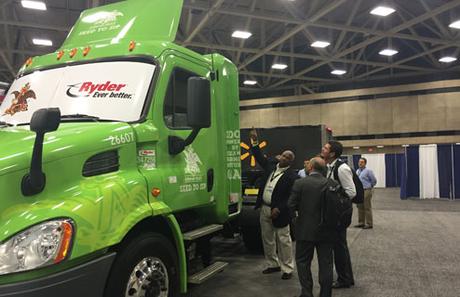 Transportation as we know it is changing with unprecedented momentum. This was obvious to over 3,000 participants in the largest clean fleet event in North America. The Alternative Clean Transportation Expo has historically been hosted in Long Beach California or Washington, DC. Last month we welcomed them to Texas.
Transportation as we know it is changing with unprecedented momentum. This was obvious to over 3,000 participants in the largest clean fleet event in North America. The Alternative Clean Transportation Expo has historically been hosted in Long Beach California or Washington, DC. Last month we welcomed them to Texas.
The week was packed with technical forums, efficiency studies, provocative speakers, networking, and a very impressive exhibition hall with over 225 exhibitors. Exhibitors shared the latest technology, equipment and every type of vehicle you can imagine.
With many topics worth noting, here were four key areas that were addressed:
1. Price – Fuel price volatility is still the top concern when considering alternatives. Oil and natural gas prices have dropped at a steady pace together. Capturing capital expense investments in the price at the pump is keeping the prices of natural gas higher than they should be when compared to gasoline. Time and new business models that include additional cash flows at fuel stations should address this over time. Everyone loves low fuel prices but a roller coaster of prices causes big headaches for fleets responding to the latest changes and trying to recover price increases from their customers. Steady and more consistent pricing make operations run smoother and benefit fuel buyers strategically.
2. Business Models (Convert, Buy, Lease) – Fleets interested in moving to natural gas can transition their fleet with a variety of business models. The list of EPA approved conversions grows longer everyday with options to convert existing fleet vehicles to dual-fuel or dedicated, CNG or LNG. Shiny new models are ready at dealerships at replacement time. Ryder is a trusted industry leader that provides lease deals with natural gas vehicle deployments in 11 states (TX, AR, FL, CA, AZ, GA, LA, MD, MI, NY, & UT) with 17 NGV maintenance facilities and 2,200 NGV trained technicians. The Company operates Liquefied to Compressed Natural Gas (LCNG) fuel stations at its Fontana and Orange, Calif., service locations.
These partnerships are increasingly attractive with fleet solutions that combine dedicated fleets, professional drivers, logistics and client branded trucks. Their safety culture with trained maintenance staffs and updated maintenance facilities help ease the transition. Employees are trained on the new technology and have a base level understanding of the difference in the natural gas vehicles versus a conventional diesel vehicle. Inbound Logistics magazine has included Ryder in its “Green Partners” listing for five years in a row.
3. Natural Gas Fleets – Natural gas continues to be the leading alternative for medium and heavy duty transportation. We see high interest from public and private fleets throughout North America. Refuse trucks and transit buses have high adoption rates. The trend to go BIG with heavy duty fleets with natural gas continues. UPS proves out their successful strategy to move 100% of their heavy duty trucks to Liquefied Natural Gas (LNG), Frito-Lay grows their large fleet using Compressed Natural Gas (CNG), and Texas based transportation leaders like Central Freight are operating hundreds of CNG trucks in the Texas Clean Transportation Triangle. These fleets make large investments in trucks and fueling infrastructure because it works. The wide spread success of natural gas fueling in California, Utah, Colorado, Oklahoma, Pennsylvania, Louisiana, West Virginia and Texas demonstrates how state-led strategies and coalitions work. Other states are organizing and will be added to the mix this year.
4. Emissions – The environment will benefit now and in the future from the research and development and ingenuity of those working to provide alternative fuel options for fleets and individual drivers. We are moving away from a transportation system in the United States that relies on oil for 99% of the transportation fuel. Improvements across the board in vehicles are decreasing harmful emissions. New alternative fuel vehicles are challenging deep-rooted beliefs and loyalties.
We are changing how America drives, one fleet and one driver at a time.
Authored by Lynn Lyon
Lynn Lyon is President of EnergyConnects with over 15 years of energy industry experience. She is an Alternative Fuel Thought Leader who served on the Board of Directors for NGVAmerica and was National Chairperson for the Natural Gas Vehicle Committee for America’s Natural Gas Alliance. She led strategic initiatives for a major upstream producer converting fleets, drilling rigs, hydraulic fracturing engines and mining equipment to natural gas fueling. For regular updates on alternative fuel follow @energyconnects1 on Twitter.

